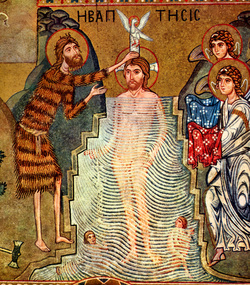 Have you ever wondered why the Baptism of the Lord is considered part of the Christmas season? It may seem an odd or even abrupt end to this short period in which we celebrated the mysteries of the birth of the Son of God into our world: angels singing magnificently to glorify God, the Magi and shepherds flocking to the manger, and the Holy Parents in profound adoration of Jesus. But though we have no figure of John the Baptist or a rendition of the Jordan River flowing in our crèche scenes, it seems to me that maybe we should! Just as all the figures in our scenes represent the mysteries of Christmas, the Feast of the Baptism of the Lord truly sums up all the lessons contained in the season thus far. This final feast not only continues to focus our attention on His identity, but it also reminds us of why He came into the world in the first place: He came to save us. After His baptism, Jesus will move forward to accomplish the mission for which He entered the world, and so all that came before this event culminates at the Jordan. The angels are still singing, though perhaps behind the scenes, and there are still followers, though they are probably not the people who had worshiped at the manger, and the profound adoration of Jesus is still alive in Mary, who continues to ponder and invites us to do so also. In some ways, nothing has changed, but now is the time for Jesus to move outward towards the reason we celebrated the season. The readings this Sunday are filled with examples of why this feast is so important to the season of Christmas. The lesson in the Gospel (Luke 3) is obvious since Jesus is proclaimed by the Father as the Son of God, the one for whom we waited so patiently (and maybe not so patiently) over the weeks prior to December 25. The Christmas season is about welcoming the newborn King into our world, but we also stepped back almost immediately to reflect upon the effects of His coming. We observed the joy of angels, shepherds, magi, and prophets. We also saw what greed and narcissism did to Herod who was threatened by the presence of a baby, and we ‘watched’ with horror when Mary and Joseph had to flee Herod's juvenile wrath. Much of what lies in the years after these events in Scripture is a mystery, but when Jesus appeared at the Jordan River to be baptized, the Father made it clear that the child at the manger who is now a man, is indeed the One for whom we waited. The waiting is over and Jesus’ ministry is ready to begin. All the lessons of the season up to this point are now activated to propel us outward into our lives with Jesus. 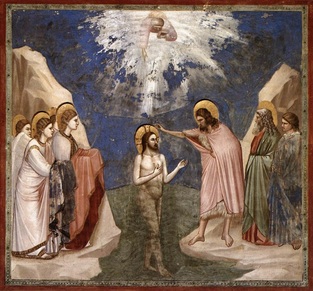 One very important insight we gain in the Baptism of Jesus, however, is about the gift of God’s mercy. The first reading for Sunday from Isaiah (Is 40: 1-5, 9-11) reminds us that Jerusalem, (a representation of the entire people of Israel), did not deserve to be forgiven after the sins which led them into destruction. But a voice cries out with triumphant joy that the people are to “prepare the way of the Lord” who will “fill in every valley” and “reveal His glory.” They are told “fear not” and “here is your God.” These people had sinned horrifically, yet God in His mercy was not only bringing them home safely, but He was revealing His glory to them through the reminder that a Messiah would come. They certainly seem unworthy of such a great gift, but nonetheless there was great joy at this homecoming crafted by their merciful God. Then in the second reading (Titus 2:11-14; 3:4-7) the author writes a stunning line: “When the kindness and generous love of God our savior appeared, not because of any righteous deeds we had done but because of his mercy, he saved us through the bath of rebirth and renewal by the Holy Spirit, whom he richly poured out on us through Jesus Christ our savior….” We are saved not because of our own merit, but because it is simply in the nature of God to love us this way. Like the people of Jerusalem mentioned in Isaiah, we do not deserve God’s forgiveness and we do not deserve the gift He gives us in Baptism. But He offers it to us anyway. The Feast of the Baptism of the Lord demonstrates to us what mercy is, and it is the same Jesus who came into the world at Christmas who personifies the unfathomable mercy of God. 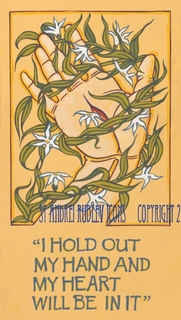 Mercy is this: to love and do that which love requires not because a person deserves it, but because it is what Love does. If the person does deserve it, than what we are offering is kindness, not mercy. Of course, this is a good thing, too, but there is a difference between the two. True mercy is offering our gifts to others, not because we think they deserve them, but we do so when they do not deserve them, and even better, when they least deserve them. This is how God loves us. Jesus came into the world not because we merited it, but because God has always loved His people with a love beyond our comprehension. In truth, it is not about our worthiness: it is about having the humility to accept this gift because not to do so would be to do ourselves great harm and it would be an act of ingratitude to the One who loves us so dearly. When Jesus was baptized by John in the Jordan River He was offering us the ultimate in the mercy of God: we, the undeserving, are invited into the mystery of God’s love in the same way that Jesus is. Jesus did not need baptism, rather He is baptism. Because of His mercy we are invited into His death and resurrection and are given the gifts of faith, hope and love, which are at the heart of what it means to be a Christian. For us, these gifts are the foundation of how to live with mercy. And like Jesus, we are to share these gifts with those around us whether they deserve it or not. 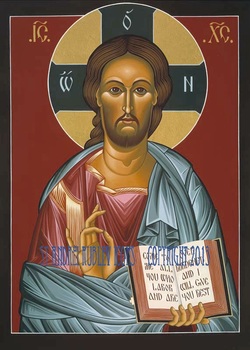 In this Jubilee Year of Mercy it seems that this lesson cries out to us. Living mercifully is what makes us a true disciple of Jesus; it helps us to grow in relationship with God and hence, we become sanctified. Therefore, we are to act with mercy toward those who threaten us (like Herod); toward those whose customs or religion we may not understand (like the Magi); towards those who are poor or do not conform to the standards of society (like the shepherds); towards those who may say and do things that seem a bit odd (like the elderly prophets Simeon and Anna); towards those who seem to be above us in status or education (like the rabbis in the Temple); and towards those in political power (like the Romans and Herod). In each of these situations mercy may be acted upon differently. It may mean remaining hidden and humble. It may mean retreating from sight so as to avoid the threat of harm until we are stronger. It may mean opening our homes and our coffers. It may mean listening to the opinions of those with whom we disagree. But no matter what the circumstance, we are to discern how to best act with mercy toward the one who we think least deserves it, because at the end of the day they are really not unlike us at all. The Christmas season fittingly culminates with a joyous lesson about what Jesus had come to offer His people. The Feast of the Baptism of the Lord reminds us of the great gift of God’s fulfilled promises in the coming of His Son. It teaches us to accept with gratitude the gifts we have been offered, especially the gift of God’s mercy. This feast also teaches us that it takes time and preparation to become ready, and that at some point we have to leave the security of the stable and venture out to the river. And it is a reminder that the gift of mercy we have been given, we are to give as a gift. Let us continue to rejoice with the angels who sing of God’s glory because we are given such incredible love and mercy through the coming of a baby who grew to reveal that He is the Messiah and Lord so that we might follow Him into Heaven. Let us have a joyous finish to our Christmas season as we gather at the Jordan with John the Baptist and Jesus. 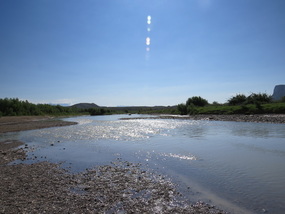 May we recognize the great gift of mercy and love revealed to us during this Christmas season! May we be filled with gratitude in receiving God’s mercy through the gift of Jesus who offers us Baptism! May we learn how to give the gift of mercy, especially to those whom we find challenging! May we learn the patience of prayerful preparation which enables our growth in holiness! And may we accept the unfathomable love and mercy of our God who came in to the world as a vulnerable baby in order to offer us the wealth of salvation! Let us share in the joy of the angels as we meet at the river! Peace! ©Michele L. Catanese The first icon is a mosaic of The Baptism of Jesus by John the Baptist which is in the Palatine Chapel in Palermo, Sicily. This chapel is magnificent in its iconography and this is one of many mosaics that depict biblical scenes. Next is another version of the Baptism of Jesus. This one is by the medieval painter, Giotto, who is one of my favorite artists. I like the vivid colors and clarity of his work. Next is an image painted by Fr. William Hart McNichols called I Hold Out My Hand and My Heart Will Be In It. It can be found at http://fineartamerica.com/featured/i-hold-out-my-hand-and-my-heart-will-be-in-it-225-william-hart-mcnichols.html. This image speaks to me of the tender, boundless mercy of God. Next is an icon, also by Fr. William Hart McNichols called Christ All Merciful. It can be found at http://fineartamerica.com/featured/christ-all-merciful-022-william-hart-mcnichols.html. Finally, the last image is a photo I took while at Big Bend National Park in west Texas. This is the Rio Grande River in the sunshine on what was a glorious day. One could almost hear angels glorifying God (if one listened intently with all one's senses). Comments are closed.
|
Heart Speaks to Heart
|

 RSS Feed
RSS Feed

